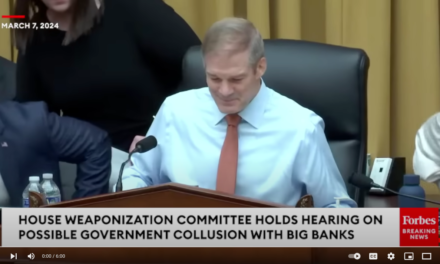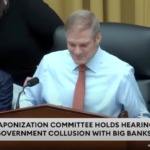A recent claim by Jim Jordan brings to light concerns over a ‘secret’ portal allegedly used by government agencies to track citizens, sparking discussions on privacy, surveillance, and civil liberties.
The controversy began with the revelation that the FBI, in collusion with big banks and businesses, has been spying on Americans. This investigation was propelled by the testimony of an FBI whistleblower, George Hill, who disclosed that the FBI received purchase data from Bank of America, targeting customers in the Washington DC area between January 5th and 7th, 2021. Particularly alarming was the FBI’s interest in overlaying this data with records of any firearm purchases, conducted without warrants or customer notification.
Witnesses, including Hill, a supervisory intelligence analyst from the FBI’s Boston field office, and Steve Jensen, the FBI’s domestic terrorism operation section chief, testified to the inappropriateness of these actions, stating that the collected information was subsequently sent back to FBI headquarters.
The investigation unearthed that this financial surveillance extended beyond a single instance, suggesting that the federal government has been compiling profiles on American citizens based on their political beliefs. The FBI and banks have been utilizing a controlled access portal known as the Domestic Security Alliance Council (DSAC) for information sharing, though the details of this portal remain shrouded in secrecy.
Furthermore, the criteria for surveillance have raised eyebrows. Americans who express opposition to gun registration, advocate for a secured border, or refuse vaccine mandates are reportedly categorized as potential domestic violent extremists, with their financial transactions flagged accordingly.
This discourse also touches on the broader implications of government agencies targeting citizens for their legal and constitutional behaviors. Individuals, including parents, pro-life Catholics, and those critical of lockdowns, vaccine mandates, and gun registration, are labeled as extremists. The discussion extends to the censorship of Americans and the alleged collaboration between big government and big tech in suppressing free speech.
The use of banks to access financial data without proper procedural safeguards or customer notification has emerged as a central concern. As the ranking member is given the floor for an opening statement, witnesses are prepared to delve deeper into these issues, highlighting the delicate interplay between security measures and the fundamental rights of citizens.
This unfolding story raises pressing questions about the extent of surveillance in America and the implications for personal freedoms. As the investigation continues, the need for transparency and accountability from both government and corporate entities becomes increasingly apparent, underscoring the ongoing debate over privacy in the digital age.


















